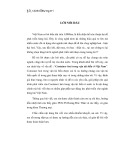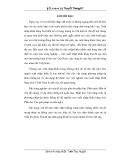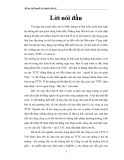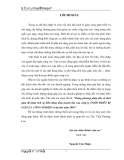Tài liệu Thư viện số
- Giáo trình SPKT (418 )
- Luận văn, luận án (2865 )
- Đồ án, khóa luận tốt nghiệp (9613 )
- Tài liệu tham khảo (1350 )
- BC nghiên cứu khoa học (1589 )
- Kỷ yếu hội thảo (12 )
- Tạp chí khoa học (62 )
- Luật (349 )
- Cơ khí chế tạo máy (2344 )
- Điện - Điện tử (4378 )
- Cơ khí động lực (1242 )
- Xây dựng - Kiến trúc (3233 )
- Thực phẩm, Môi trường (1087 )
- Công nghệ thông tin (3074 )
- Kinh tế - Quản lý (4140 )
- In - Truyền thông (383 )
- CN May - thời trang (832 )
- Nghệ thuật - Ẩm thực (1516 )
- Nông - Lâm - Ngư Nghiệp (763 )
- Y học - Sức khỏe (620 )
- Khoa học xã hội (3535 )
- Lịch sử - Địa lý - Du lịch (492 )
- Khoa học tự nhiên (2112 )
- Văn học (2585 )
- Ngôn ngữ (4289 )
- Khoa học ứng dụng (408 )
- Thông tin Tuyển sinh (61 )
- Thông tin -Thư viện (418 )
- Thể loại khác (1376 )
Danh mục TaiLieu.VN
- Mẫu Slide Powerpoint
- Kinh Doanh Marketing (39320)
- Kinh Tế - Quản Lý (30571)
- Biểu Mẫu - Văn Bản (123435)
- Tài Chính - Ngân Hàng (23744)
- Công Nghệ Thông Tin (56521)
- Tiếng Anh - Ngoại Ngữ (9738)
- Kỹ Thuật - Công Nghệ (44193)
- Khoa Học Tự Nhiên (27343)
- Khoa Học Xã Hội (43227)
- Luật - Kinh tế luật (6560)
- Văn Hoá - Thể thao - Du Lịch (71283)
- Y - Dược - Sức Khoẻ (83234)
- Nông - Lâm - Thuỷ sản (16418)
- Luận Văn - Báo Cáo (217024)
- Tài Liệu Phổ Thông (244133)
- Trắc Nghiệm Online (213578)
- Trắc Nghiệm MBTI
- Trắc Nghiệm Holland
Game Theory for Applied Economists
This book introduces one of the most powerful tools of modern economics to a wide audience: those who will later construct or consume game-theoretic models. Robert Gibbons addresses scholars in applied fields within economics who want a serious and thorough discussion of game theory but who may have found other works overly abstract. Gibbons emphasizes the economic applications of the theory at least as much as the pure theory itself; formal arguments about abstract games play a minor role. The applications illustrate the process of model building--of translating an informal description of a multi-person decision situation into a formal game-theoretic problem to be analyzed. Also, the variety of applications shows that similar issues arise in different areas of economics, and that the same game-theoretic tools can be applied in each setting. In order to emphasize the broad potential scope of the theory, conventional applications from industrial organization have been largely replaced by applications from labor, macro, and other applied fields in economics. The book covers four classes of games, and four corresponding notions of equilibrium: static games of complete information and Nash equilibrium, dynamic games of complete information and subgame-perfect Nash equilibrium, static games of incomplete information and Bayesian Nash equilibrium, and dynamic games of incomplete information and perfect Bayesian equilibrium.
Từ khóa: cân bằng Nash , Bài toán Cournot, lý thuyết trò chơi, lý thuyết kinh tế, kinh tế học, cạnh tranh độc quyền
142 p 275849 25/09/2012 868 10
Bạn đang xem trang mẫu tài liệu này.







